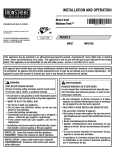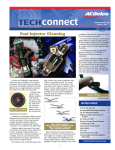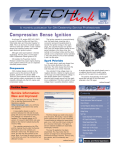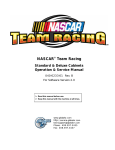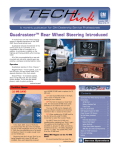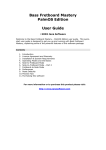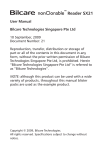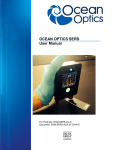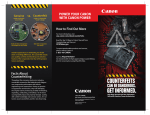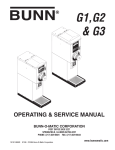Download The Real Deal – ACDelco and Counterfeit Parts
Transcript
March/April 2005 Volume 12, No.2 The Real Deal – ACDelco and Counterfeit Parts When fake or counterfeit products are discussed, many people think of an imitation Rolex watch that can be bought on a street corner in New York or a pirated Commonly Counterfeited Parts Counterfeit auto parts are a worldwide problem. In most cases, counterfeiters distribute high volume parts that automo- Can you spot the fake? ACDelco is stepping up its efforts to identify counterfeit parts. Hollywood blockbuster available on DVD while the original is still playing in theatres. But what about automotive parts, especially the ones that are available at an unbelievable price? Are they the real deal or are they fakes? Chances are if it appears to be “too good to be true,” it usually is. When you install an ACDelco part, you have confidence that the part will serve your customer well. You trust that ACDelco parts will operate safely and provide the performance you can rely on. That’s why you choose genuine ACDelco parts over a wide range of competing automotive parts. But in the world of counterfeiting, any recognizable brand is at risk, whether it’s automotive parts, designer purses, batteries, air compressors, vodka, shampoo, computer software or baby formula. The U.S. Department of Commerce estimates the losses to U.S. business from counterfeiting of trademarked consumer products is $200 billion a year. tive service centers install every day. Some of the most commonly counterfeited auto parts are oil and air filters, brake pads, shock absorbers, wheel covers, spark plugs and batteries. It’s not easy to spot these and other fake parts, even for the experienced eye. Those who distribute counterfeit parts go to great lengths to fool you. The parts may be old parts that are cleaned up or parts that are manufactured to look like brand name parts. Even the packaging can look amazingly like the original, using the same colors, graphics and type fonts. But counterfeit parts don’t deliver the quality and performance of the brands they imitate, frequently wearing out faster and having to be repaired more often as well as posing a safety risk. Maximizing Profits with Minimum Investment As with any business enterprise, the goal of counterfeit parts makers is to maximize their illicit profits. The easiest 1 way to do this is by copying the designs of the best products on the market. They produce imitation products using lower quality, less expensive materials and with the least costly labor available. China is a major source of counterfeit automotive products, but it is not the only source. According to the International AntiCounterfeiting Coalition, raids on Chinese auto parts factories have uncovered thousands of counterfeit parts, such as windshields and suspension control arms; fake parts that had a value of nearly $4 million. Because of their poor quality and manufacturing, which often does not meet Original Equipment (OE) requirements, mechanical failures of counterfeit parts are much more common. Recently confiscated counterfeit brake pads from China failed to meet a single OE standard for brakes. Other counterfeit brake pads were found to be made of nothing more than steel wool and pressed wood. Counterfeiters also take advantage of the reputation of the highly recognized brands in the marketplace to sell their look-alike products. With the counterfeit parts easily available, it is very difficult for legitimate companies to expand their continued on page 3 IN THIS ISSUE The Real Deal . . . . . . . . . . . . . . . . . . . . . . . . .1 Electric Power Steering . . . . . . . . . . . . . . . .2 Proactive Battery Testing . . . . . . . . . . . . . .4 Maintenance Inspections Lead to Increased Sales . . . . . . . . . . . . .5 Resistance Calculated Oxygen Sensor Heater Temperature . . . . . . . . . . . . . . . . .6 Sports Report . . . . . . . . . . . . . . . . . . . . . . . . .6 Tech Tips . . . . . . . . . . . . . . . . . . . . . . . . . . . . .7 “Shock-It-Two-Me” . . . . . . . . . . . . . . . . . . .8 ACDelco Receives Highest Rating . . . . . . .8 Replacing Fuel Tank Module/ Fuel Pump Module . . . . . . . . . . . . . . . . . .8 Merchandise Kits . . . . . . . . . . . . . . . . . . . . .8 acdelcotechconnect.com Electric Power Steering In recent years, a number of vehicles have offered steering systems involving electronics. The Magnasteer system, for example, used on a variety of GM cars, has an electronically controlled magnetic unit to vary the amount of effort needed to steer the vehicle. Quadrasteer, available on several full-size GM trucks and SUVs, uses an electronically controlled electric motor to provide steering for the rear wheels. The Electric Power Steering (EPS) system used on Chevrolet Malibu and Cobalt features an electric motor to provide steering assist to the front wheels. This eliminates the power steering pump, hoses, control valve and piston/cylinder assembly. EPS Overview The EPS motor provides a variable amount of assist directly to the steering shaft, based on vehicle speed and input torque. The motor and the Power Steering Control Module (PSCM) are mounted as an assembly directly to the steering column. The EPS motor is a 65 amp, brushless, 12-volt reversible unit. It drives the steering shaft through a worm shaft and 22:1 reduction gear. This method of providing boost is considerably different from a hydraulic assist. In the hydraulic system, pressure is applied directly to the steering rack to help move it side to side. On the EPS system, boost is applied to the steering shaft, which helps the driver turn the steering pinion. Because the electric motor draws a large amount of current when it is running, the system has built-in overload protection. Heat build-up may be a factor at high ambient temperatures, when a large amount of steering wheel movements occur in a short period of time (such as repeatedly performing lock-tolock turns, while standing still). It’s unlikely that a customer will experience this. The software in the controller keeps track of current usage and compares that with the known heat buildup of various components. If a heat threshold is reached, the controller uses pulse width modulation (PWM) to temporarily limit current to the motor. This is called de-rating. In this rare instance, the driver would notice a temporary reduction in boost. The EPS control module depends on various inputs: • Vehicle speed • Steering shaft torque sensor • Steering wheel position sensor In a hydraulic power steering system, the input and output steering shafts are joined by a small torsion bar. Two halves of a hydraulic flow valve are attached, one to each shaft. When torque is applied, the torsion bar twists, the valve halves move relative to each other, and fluid is allowed to flow. In the electric power steering system, the upper and lower torque sensor rotors, which use resistive elements, are mounted to the input and output shafts. When torque is applied, the torsion bar twists, the rotors move relative to each other, and the movement affects the difference in resistance between the two rotors. This electrical information is used by the PSCM as the torque input. Boost is provided, proportional to torque. The combined torque/hand wheel position sensor assembly is contained within the steering column. Each EPS unit is calibrated for the vehicle in which it is installed, which ensures the proper amount of assist and road feel. The calibration is called the Steering Tuning Selection and is specific to the vehicle’s VIN. It can be read from the module, using a scan tool. Diagnosis and Service Diagnosis of the EPS system is aided by the following data readouts using a scan tool: • Battery Voltage • Calculated System Temperature • Engine Speed • Motor Command • Motor Feedback • Steering Shaft Torque • Steering Position Sensor • Steering Tuning Selection • Steering Wheel Position • Torque Sensor Signal • Vehicle Speed The PSCM module communicates using the GMLAN network. The EPS motor and control unit are replaceable as an assembly. The torque sensor and steering wheel position sensor are serviced by replacing the steering column assembly. If components are replaced in the EPS system, it is necessary to perform a hand wheel position sensor calibration so the system knows where the center position is for the steering wheel. There’s a torque sensor zero calibration, which affects on-center effort bias. And, the correct Steering Tuning Selection will also have to be made so the system knows which boost curve to use for that particular vehicle. 2 ACDelco TechConnect is published bi-monthly for retail technicians to provide timely service information, increase knowledge and improve the performance of the service center. Publisher & Editor: Greg Baker ACDelco E-mail / [email protected] Technical Editors: Mark Spencer E-mail / [email protected] Jim Horner E-mail / [email protected] Desktop Publishing: Greg Szpaichler, MediaWurks E-mail / [email protected] Write to: * ACDelco TechConnect P.O. Box 500 Troy, MI 48007-0500 : On the Web: acdelcotechconnect.com ACDelco service tips are intended for use by professional technicians, not a “do-it-yourselfer.” They are written to inform those technicians of conditions that may occur on some vehicles, or to provide information that could assist in the proper service of a vehicle. Properly trained technicians have the equipment, tools, safety instructions and know-how to do a job properly and safely. If a condition is described, it cannot be assumed that the information applies to all vehicles or that all vehicles will have that condition. All materials and programs described in this magazine are subject to change. Submission of materials implies the right to edit and publish. Inclusion in the publication is not necessarily an endorsement of the individual or the company. TechConnect is published for ACDelco by Sandy Corporation, Troy, MI. ©2005 ACDelco. All rights reserved. The Real Deal — ACDelco and Counterfeit Parts sales and gain market share. In growing markets, such as China and the Middle East, approximately 30% of all auto parts are fakes. In the end, established automotive parts brands lose sales, profits and intellectual property. And consumers lose because they ultimately experience a poor quality product along with non-existent service and no associated warranty. The Costs of Counterfeiting Automotive counterfeiting is big business. According to the Motor & Equipment Manufacturers Association (MEMA), the total impact automotive parts counterfeiting has on the automotive industry is estimated to be $12 billion per year in global business by automotive parts suppliers. The National Association of Manufacturers estimates that trade in counterfeit or pirated products accounts for about 5-to-7 percent of world trade every year — that’s approximately $500 billion. Compare that with bank robberies, which total less than $100 million a year, and it’s easy to see this isn’t a problem of petty theft. For example, in working with law enforcement agencies around the world, GM has seized approximately $250 million in fake parts since the mid-1980s. Ford also has conducted raids in cooperation with local law enforcement agencies that targeted companies that were manufacturing counterfeit Ford products. The cost of counterfeiting goes beyond simple sales numbers. In terms of employment, the loss of $12 billion in auto parts sales is approximately equivalent to more than 200,000 manufacturing jobs in the auto industry. In addition, there are costs associated with the tarnished reputation and dilution of brand names, packaging and product redesigns, legal fees and investigations, and warranty claims caused by counterfeit products. For TSS service centers that rely on the quality of ACDelco parts, counterfeit parts undermine your business in several ways. • Profit – Fake parts that don’t work or fail quickly tie up your service bays, causing productivity and profits to suffer. Failing parts also lead to safety issues for your customers. And — from page 1 counterfeit parts don’t come with the backing of a reputable manufacturer to support you. • Relationships – You work hard to develop trust with your customers. If your service center acquires a reputation for sub-quality parts, you could lose customers or even your business. Unhappy customers tend to take their business elsewhere, while telling their family and friends to do the same. • Prosecution – Yes, using counterfeit parts can lead to lawsuits from customers. Legal action also can be taken against your service center by government agencies as well as the manufacturers of the copied parts. a variety of venues to help identify parts counterfeiters. These include an anonymous “aware” line that people can call to share tips about counterfeit activity. Mystery shopping also is used to uncover which businesses may be handling counterfeit parts as well as to respond to customer complaints. In an effort to make counterfeiting even more difficult for imitation parts producers, ACDelco is now affixing a distinct mark on certain parts. This mark will assist officials in distinguishing genuine products from their fake counterparts. If you suspect parts may be counterfeit, ask yourself these questions: On the Lookout for Fakes As part of a cooperative effort to reduce counterfeiting, a wide network of OEM’s, industry partners and government agencies are working together to identify potential counterfeiting operations around the world. In Central Africa, for example, customs officials estimate that one seatainer of counterfeit ACDelco batteries is imported each month. Federal-Mogul, working with Chinese authorities, has seized more than 600,000 counterfeit Champion spark plugs and thousands of counterfeit packaging materials. In response to reports and operations like these, GM has put together Global Brand Protection Teams that work with local law enforcement agencies in North America, South America, Asia/Pacific, Europe and the Middle East investigating counterfeiting reports. Since 2002, more than 600 cases have been investigated. GM and ACDelco also have developed • Were the parts offered at a significantly lower than usual price? • Did you buy from a reputable dealer or supplier? • Do the parts vary in shape, size and texture? • Is the packaging different, even slightly, from what you’re used to seeing? • Does each part fit exactly as it should? Retail customers should be on the lookout for fakes too, especially since counterfeit parts potentially can lead to safety and durability issues. The best defense against counterfeit parts, as you can point out, is to obtain automotive service through an authorized ACDelco service center. Counterfeiting is a Crime Reporting Counterfeit Parts The effects of counterfeit automotive parts are far-reaching for suppliers, the labor force and consumers. Many auto parts suppliers point out that counterfeiting: • Steals good manufacturing jobs. • Destroys the brand reputations of legitimate companies. • Creates inferior automotive products that are a risk to consumer safety. • Generates cash for organized crime. If you suspect a part is fake, please contact the GM Global Brand Protection Team. 3 Web: Visit acdelco.com and click on the links to Parts Information; Brand Protection; and Report Counterfeit Parts to fill out an information form. Email: Send a message to [email protected] Phone: If you prefer to remain anonymous, please call the GM Awareline at 1-800-244-3460. An Idea that Works — Proactive Battery Testing A service program promoted a few years back included testing the battery in every vehicle that was brought in for service. The result was a jump start in sales. Since then, some valuable best practices have been learned. In addition, new, more accurate testing equipment has been developed that offers a number of excellent marketing features. To get started, here’s a brief overview of the proactive battery testing program. Testing Every Battery Proactive battery testing involves providing a free battery test as part of your standard service on every vehicle that comes into your service center. Midtronics offers a battery tester with printing capability, which allows you to give customers a detailed, easy-to-understand printout of their battery’s condition. It’s important to provide the test results even when the battery is good, because “good news is always good.” The idea is that you are offering a valueadded service, and perhaps your competition is not. Plus, you’re providing your customers with additional peace of mind as well as highlighting the fact that you sell and install batteries. As regular customers see their battery condition decline over the months in service, they will practically sell themselves a battery when the time is right. It helps to keep a record of the battery tests with the vehicle history, to help show customers the results of different tests performed over a period of time. Statistics show that 10–15% of vehicles on the road will need a new battery in the next 90 days. By testing the battery on every vehicle that you service, it’s possible to tap into the 10–15% that comes through your shop. In turn, your battery and related electrical sales will have the potential to increase three to five times Battery tester your current and printer kit sales levels. That’s the simple basis of proactive battery testing — providing customers with a running status report of the health of their battery. The proof is in the printouts. And when it comes time for a new battery, you’ll be there with the right ACDelco battery for their vehicle and budget. More Accurate Battery Testing There have been a number of new developments in battery testing recently. Midtronics new Micro500 XL battery tester has several key improvements over the original Micro500. The Micro500 XL is more accu- rate across a greater range of batteries, including Absorbent Glass Mat (AGM) batteries. Midtronics also has improved invehicle accuracy with algorithms for sideterminal and jumper-post applications. Tester cables are now detachable, and therefore, replaceable in the field. Beyond battery testing, the Micro500 XL tests starting and charging systems. The battery test takes just seconds, and a full system test takes about 2 minutes. The full system test is recommended whenever you find a bad battery. Before putting a new battery in a vehicle, make sure it wasn’t a bad alternator that killed the battery in the first place. Printing Up Sales Proactive battery testing is a great customer service, but it is test printouts that really help sell your products and services. With that in mind, it’s important to look at battery testers with printing capability. The Midtronics printer that comes with the Micro500 XL battery tester comes with rechargeable batteries and an AC adapter. And it provides a wide variety of information. The printer can be programmed so that your business name, address, and phone number appear on the printout. There also is a date and time field, and easy-to-read graphs now accompany the test data. It even has the ability to create a coupon on the printout. Plus, it’s much faster than the original. The part number for the complete battery tester kit with printer is MCR-500XL KIT. Offering a Free Battery Check Proactive battery testing seems like a simple idea, but how do you adopt such a program? It’s easy. Just make it the norm for your business. Advertise that you perform a free battery check for your customers. This can be done in a variety of ways: • Window signs • Street signs (marquee or stand-alone signs) • Flyers and customer receipts • Yellow pages and/or website • Direct mail and coupons • On your “menu-board” with the list of your standard services and prices It’s preventive maintenance that your customers will appreciate. Quick-lubes and 10minute oil change shops pioneered the concept of preventive maintenance with free multipoint inspections, and many now offer a free continued on page 5 4 Providing your customers with a printout like this will help keep them aware of the condition of their battery. Maintenance Inspections Lead to Increased Sales Tires, brake pads, accessory drive belts, hoses, spark plug wires, air filters and wiper blades are just a few of the items that can be inspected while servicing vehicles in your service center. Using an inspection form to record the results of a maintenance inspection can lead to increased revenues while at the same time promote customer satisfaction. Here are a few key stats about inspection form usage from a recent study by the Car Care Council. The study indicated that 77% of vehicles on which maintenance inspections where performed needed service. And 40% of customers had the service work completed that was called out on the inspection form. In addition, according to the 30,000 vehicle study, the average RO resulting from the use of an inspection form was $100 higher and averaged 15% more on parts and labor than those vehicles that were not inspected. 27 Point Inspection A 27 point inspection form is available to TSS service centers from Reynolds & Reynolds. With a list of inspection items from tires and brakes to heater and air conditioning operation, the form shows customers exactly what has been inspected on the vehicle. The form not only provides a record of the maintenance inspection, but also can be used as a future service reminder. By providing an opportunity to discuss service work with customers, the inspection form can help build the creditability of the service center, enhancing customer satisfaction for more repeat and referral business. The 27 point inspection form also: • Shows customers your service center values their business • Reduces the chance of missing conditions that might require service in the near future • Promotes your service center and the ACDelco brand Along with the inspection form, Reynolds & Reynolds offers all kinds of business forms for TSS service centers including repair orders, laser copier paper with the ACDelco logo, hang tags, invoices, business checks, statements and more. For more information, contact your Reynolds & Reynolds account manager at 1-877-912-3651. An Idea that Works — Proactive Battery Testing — from page 4 backs for in-vehicle use. As far as high-volume testing goes, you will literally burn up a carbon-pile if you use it a lot. The in-vehicle limitations of load testing include: • Loading a battery with a bad cell or that is “gassing” could result in an explosion • The load can damage expensive vehicle electronics such as sensors • The battery is severely discharged • It takes too long and is too bulky to use There are other limitations to load testing, but you get the idea. Recently, several handheld battery testers have been introduced, but the Midtronics Micro500 XL and other Midtronics testers offer the best overall value with their accuracy, ease of use, great features and service. That’s why they are required tools by virtually all OEM dealers. All standard Midtronics equipment is available through your local ACDelco distributor. For more information about Midtronics equipment, visit www.midtronics.com or call 1-800-776-1995 and ask for the ACDelco account manager. In the competitive marketplace, every advantage is an important one. Testing the battery on every vehicle in your service center — and advertising this free service — is one more advantage you can use to help your customer satisfaction and sales grow. battery check too. Standardizing a free battery test ensures that you keep up with the competition. Overcoming Objections How do you sell your customers a battery even though their vehicle started today? Use experience and test data to help close the sale. And if not today, then tomorrow by building a trustworthy relationship. For example, say the original battery installed in a 2000 model year vehicle is tested. The battery, rated at 525 CCA, had a test result of 498 CCA, 12.61 V, GOOD BATTERY. Your experience has been that batteries last 4 to 5 years in your area (this varies by geography, but generally in hot climates such as Phoenix, batteries may last only 1.5 to 2 years, while in cooler climates such as Detroit, batteries often have a service life of 4 to 5 years or more). You could explain what your experience has been with battery life, note that the cranking power is below the rated CCA, and potentially make the sale. Why Wasn’t This Done Before? If proactive battery testing is such a great idea, why wasn’t this done before? The answer is that carbon-pile load testers were not intended for high-volume use, and have key draw5 Resistance Calculated Oxygen Sensor Heater Temperature (RCOHT) More and more GM vehicles are now using a relatively new oxygen sensor temperature control strategy called Resistance Calculated Oxygen Sensor Heater Temperature, or RCOHT. How does RCOHT work? The RCOHT strategy will learn the resistance of the oxygen sensor heater circuit, at start-up, after a cold soak has occurred. At start-up, the engine controller briefly samples the oxygen sensor heater current; it then calculates the resistance of the oxygen sensor heater, based on the sampled current and the measured supply voltage (system voltage). Once the initial resistance is known, a resistance-to-temperature model can be followed as the calculated resistance changes during operation. From this model, the engine controller can very accurately control the temperature of the oxygen sensor heater. An expected range of oxygen sensor heater resistance characteristics is stored within the engine controller for that specific package. The engine controller must know the initial resistance of the heater in order to determine which resistance model to follow. The initial resistance calculation can be made only after an extended soak period, so the engine controller can accurately determine the equivalent “room temperature resistance” of the oxygen sensor heater. This “room temperature” is based on the engine coolant temperature sensor (ECT) and intake air temperature sensor (IAT) values. In other words, the engine controller can safely assume that when the extended soak conditions have been met, the oxygen sensor will be at the same temperature as the ECT and IAT. Although not specific to any particular platform, an extended soak can be roughly defined as: The engine has been off for more than 10 hours AND the ECT and IAT are within 8° C (14.4° F) of each other at start-up. Why use a new strategy? RCOHT provides much more accurate control of the oxygen sensor heater temperature. Other temperature control strategies attempted to “predict” the oxygen sensor temperature by using some form of a temperature prediction model. RCOHT allows accurate oxygen sensor heater control even if there is a resistance variation between newly manufactured oxygen sensors or if the resistance changes as the sensor ages. One problem faced in the past was the possibility of over-predicting the heater temperatures of a high resistance oxygen sensor and the possibility of underpredicting the heater temperatures of a low resistance oxygen sensor. Because the engine controller is now calculating the resistance of the oxygen sensor after each extended soak, the temperature of the sensor heater can be more accurately controlled throughout the life of the sensor. What happens if there is a failure with the heater circuit or the engine controller does not learn the sensor resistance? A gross failure (open, short to ground, short to voltage) on the heater circuit should set a heater driver Diagnostic Trouble Code (DTC) and/or a heater current monitor code. If there is a high resistance condition within the heater circuit, it is possible the engine controller will learn an incorrect heater resistance value and not set one of the above DTCs. On some applications, a failed learn or an incorrect learn will cause other DTCs to set. The service information diagnostic tables for these DTCs have taken this possibility into account and will provide appropriate testing procedures. Some vehicle applications do not report a failed or incorrect resistance learn. In these applications, additional DTCs may set in the event of heater degradation or failure. On certain applications, starting in the 2005 model year, there will be specific DTCs for a failed learn or a learned resistance that is out of range. What to do when an oxygen sensor is replaced? When a new oxygen sensor with the same part number is installed, it may have a different heater resistance than the previous sensor. In most cases, an extended soak does not occur, nor is it realistic to expect it to occur, immediately after oxygen sensor replacement. However, the engine controller should not control the new sensor based on the calculated resistance of the old sensor. This may cause under- or over-prediction of the heater temperature of the new sensor. Therefore, it’s important to perform a reset procedure after replacing an oxygen sensor on a vehicle using RCOHT. The reset procedure is required to prevent the possibility of heater damage (high temperature) to the new oxygen sensor. This will allow the vehicle to be returned to service as quickly as possible. To reset the oxygen sensor learned resistance, a code clear is required. The re-set procedure is required after the sensor is replaced, REGARDLESS OF WHETHER OR NOT ANY DTCs ARE PRESENT! When a reset procedure is performed, a default resistance value will be used until an extended soak occurs. This default resistance will allow the new sensor to operate without the possibility of heater damage until an extended soak occurs. More and more engine applications will incorporate the use of the RCOHT strategy. Refer to the appropriate service manual oxygen sensor diagnostic information and replacement procedures for the vehicle you’re servicing. This will provide you with a notice about whether to perform a code clear or use an available scan tool feature to reset the learned resistance after sensor replacement. ACDelco Sports Report NASCAR Busch Series Stock Car Racing Driver: Clint Bowyer Car: #2 Chevy Monte Carlo Richard Childress Racing Clint Bowyer is off to a fast start as the new driver of the #2 ACDelco car with one top 5 finish in the first two Busch Series races. 2005 Driver Standings (through 2 of 35 races) 1. Kevin Harvick 4. Clint Bowyer Points 340 287 IHRA Hooters Pro Modified Series Drag Racing Driver: Harold Martin Car: Pontiac Grand Am Harold Martin kicks off the 2005 IHRA Hooters Pro Modified Series at the Amalie Oil Texas Nationals, San Antonio Raceway, March 31-April 2. NHRA POWERade Pro Stock Series Drag Racing CITGO BASSMASTER Tournament Trail Driver: Kurt Johnson Car: Chevy Cavalier Kurt Johnson is off to a strong start in the competitive 2005 NHRA POWERade Pro Stock Series. 2005 Driver Standings (through 2 of 23 races) 1. Allen Johnson 6. Kurt Johnson 6 Points 166 112 Angler: Jimmy Houston Professional Angler Jimmy Houston is challenging for the Elite 50 in the 2005 CITGO Bassmaster Tournament Trail. 2005 Angler of the Year Standings Points (through 3 of 6 tour stops) 1. Takahiro Omori 53.Jimmy Houston 741 459 The following technical tips provide repair information about specific conditions on a variety of vehicles. If you have a tough or unusual service repair, the TSS Technical Assistance Hot Line can help. Call 1-800-825-5886, prompt #2, to speak with a technical expert with the latest OEM information. Duramax Diesel Engine Air Filter 2001-05 Chevrolet Silverado and GMC Sierra trucks with the 6.6L Duramax® diesel engine. Air filter GM part number 25332443, ACDelco part number A1618C, is specific to the Duramax diesel engine. It is reinforced to eliminate damage from the increased airflow of the turbocharger. The reinforcement is visually identified by five ribs of epoxy across the pleats of the clean side of the filter. The 8.1L gasoline engine air filter, GM part number 25313349, ACDelco part number A1518C, should never be used with a Duramax diesel engine. It will fit into the air box; however, it does not have the required reinforcement of the diesel air filter. Air filter Due to the greater airflow possible with the turbo, an incorrect air filter may collapse or be torn, allowing dust and dirt to be ingested. This can cause serious damage to the turbo vanes and cylinder walls of the engine. On vehicles being built today, star washers are not being used under any ground connection. It is recommended NOT to use a star washer on any ground connection to the body or chassis of the vehicle. Neutral Start Backup Switch 2001-03 Chevrolet Silverado and GMC Sierra trucks with the Allison Series 1000 Automatic Transmission (M74). The Neutral Start Backup switch (NSBU) on the Allison Series 1000 Automatic Transmission may become contaminated and corroded due to water intrusion. The switch is located on the side of the transmission. If this condition is present, multiple DTCs may be set, including any or all of the following: P0708, P0847, P0872, P0875, P1711 and P1713. There also may not be any PRNDL display or only a partial display as well as no movement. To correct this condition, install a new NSBU, GM part number 29540479, ACDelco part number D2256C. The new part has been designed with better sealing to resist internal corrosion. Follow the service manual instructions for replacement and adjustment procedures. When replacing the switch, observe these important points. First, if the NSBU does not easily slide off the selector shaft, use a file to remove any burrs or raised metal where the selector lever seats against the shoulder of the shaft. If the new NSBU is forced over this raised metal, it may fit the shaft loosely, causing possible repeat DTCs. Second, be sure to install the splash shield included with the NSBU kit. This shield is installed over the manual shaft before the shift lever and nut are installed. Failure to install this shield may result in repeat switch contamination. Also, be sure to clear all DTCs before starting the vehicle. Early production models used a W-clip connector clipped to bracket stainless steel (SS) clip on the wiring connector, GM part number 12429204, ACDelco part number 20-17, which could be removed from the bracket simply by pulling. Later production models used a plastic W-clip on the wiring connector, GM part number 12429205, ACDelco part number FW128, which requires ordinary pliers for removal. Do not replace either style of clip with the other. They are not interchangeable. Old style sensor with SS clip, left, and new style sensor with W-clip When replacing a wheel speed sensor/wheel bearing assembly, you must determine which type of sensor is on the vehicle and replace it with the same kind. Do Not Use Star Washers Under Ground Connections 1996-2005 GM passenger cars, trucks and sport utility vehicles. In the past, star washers have been used under most ground connections. It was believed using a star washer would improve continuity to ground and prevent the ground fastener from becoming loose. GM Engineering has determined that installing a star washer increases the chance for corrosion and prevents the terminal from achieving proper torque. The wiring from the wheel speed sensor is a pigtail, about 4 inches (100 mm) long, terminated with a connector. The connector clips to a bracket on the steering knuckle. During the 2001 model year, the sensors were changed. Correctly installed splash shield Wheel Speed Sensor Clips 2001 Buick Century and Regal, Oldsmobile Intrigue, Pontiac Grand Prix and Montana, and Chevrolet Monte Carlo, Impala and Venture. 7 At the time the clips were changed in production, the mounting orientation of the sensor was also changed. Sensors with the old SS clip were mounted with the wire lead near the 6 o’clock position. New sensors with the W-clip were mounted with the wire near the 2 or 10 o’clock position, depending on which side of the vehicle it’s mounted. This moves the lead away from the lower ball joint attachment. “Shock-It-Two-Me” ACDelco recently announced the “Shock-It-Two-Me” promotion, a new incentive program promoting the purchase of ACDelco shock absorbers and struts. The buy two, get two shocks and struts promotion, which runs through May 31, 2005, offers a rebate incentive to consumers and gives participating independent service centers an opportunity to win a trip to a NASCAR event. Program Information Incentives Promotional Kits Consumers who purchase four ACDelco shocks and/or struts, and have them installed at a participating service center, will receive a mail-in rebate for the price of two of the four shocks and/or struts, up to $100 per vehicle. The rebate program period is April 1–May 31, 2005. The service center from each ACDelco zone with the highest number of ACDelco shocks and struts purchases during the program period of March 1–May 31, 2005 will win a NASCAR race package. The package includes a trip for two to the Nextel Cup and Busch Series races at the Richmond International Raceway in Richmond, VA, on September 9 and 10. Roundtrip transportation, meals and three nights lodging will be provided. Promotional kits are available from ACDelco warehouse distributors for participating service centers to use during the promotion. The promotional kits include: • Promotional banner • Shock and strut countermat • Promotional poster • Counter card with rebate pad • Extra rebate pads • Undercar consumer brochures • Newspaper/magazine ad slick • Radio ad script • Direct mailer suggestions. For additional details about the “Shock-It-Two-Me” promotion and to enroll in the program, contact your local ACDelco warehouse distributor. To participate in the “Shock-ItTwo-Me” promotion, service centers must enroll with their ACDelco warehouse distributor. Qualifying shocks and struts eligible for rebate are: • ACDelco 530 series • ACDelco 503 series • ACDelco 519 series • ACDelco 520 series ACDelco Receives Highest Rating ACDelco is rated the strongest automotive parts brand with valuable consumer recognition and high-quality products by independent service centers. According to a recent study conducted by an independent market research company: • ACDelco leads its aftermarket competition on overall parts preference and brand awareness • ACDelco’s image is more highly developed than competitors in many critical aspects (including reputation for quality and customer recognition) • ACDelco is a brand that is appropriate for virtually all vehicle makes and models on the road today The study’s findings reinforce ACDelco’s position as a “brand you can rely on,” which is an attribute directly linked to purchase consideration by consumers. Replacing Fuel Tank Module/ Fuel Pump Module When replacing the fuel tank module/ fuel pump module on 2000-01 Chevrolet Suburban and Tahoe, GMC Yukon, Yukon Denali and Yukon XL, the fuel pump connector should also be replaced. Any residual damage to the con-nector may result in voltage drop across the module and may lead to repeat failures. It is important to use the splice sleeves provided with the connector due to the exposure to moisture. To check the integrity of the new splice, use the appropriate test probe. Using a larger terminal test adapter or other test equipment probes will damage the terminal. Refer to GM bulletin 04-06-04-088 for additional information. 8 ACDelco Merchandise Kits ACDelco has developed a series of merchandising kits with ready-torun promotions that are designed to help increase consumer traffic and ACDelco sales in TSS service centers. The kits include just about everything needed for a pull-through consumer promotion. Four automotive system kits with ACDelco-branded merchandise are available: Electrical (battery, starter, alternators) 10 footballs or soccer balls Thermal (A/C, heating and cooling) 12 soft-sided cooler bags Engine Performance (plugs, filters and wires) 10 motorsports T-shirts Routine Maintenance (belts, hoses and wipers) 12 umbrellas Contact your local ACDelco representative or ACDelco warehouse distributor for additional details and information on how to order the kits. TSS-PU-0111-05









